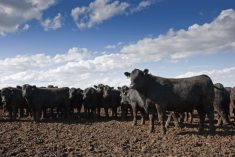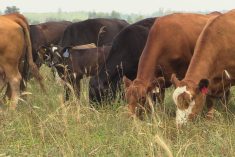Compared to last week, western Canadian yearling markets traded $3-$5 lower on average. Feeder cattle weighing 650 to 800 lbs. were relatively unchanged to $3 lower. Calves under 650 lbs. were steady to $4-$6 lower in Alberta, unchanged in Saskatchewan and $3-$5 higher in Manitoba. Fleshier yearlings and calves were heavily discounted last week with some quotes as much as $10 off average prices.
The feeder market is adjusting to the rise in corn prices which have jumped nearly $50/tonne from mid-February. Feedlot operators that booked their feed grain requirements earlier were more aggressive; however, feedlots purchasing corn on a hand-to-mouth basis were rather quiet in the feeder complex. The deferred live cattle futures $5-$6 off the February highs which also dampened buying enthusiasm.
Read Also

JBS profit falls amid still-challenging US market environment
JBS, the world’s largest meat company, reported a net profit fall in the third quarter in spite of a rise in global net sales amid a still-challenging beef market environment in the U.S., according to an earnings statement on Thursday.
Colder temperatures and adverse pen conditions contributed to the softer tone, especially for calves. The market had a small risk discount due to weather. The quality of cattle was also quite variable last week. Order buyers were having a difficult time attracting interest and major feedlot operators focused on local cattle. Feedlot operators are gearing up for a cold wet spring and straw is expensive.
In the Lethbridge area, Angus-based steers holding thinner butter on light grain ration with controlled weight gains weighing 825 lbs. were quoted at $190. South of Edmonton, Simmental mixed steers with lower flesh on light grain with full shots averaging 835 lbs. sold for $193; Charolais-based heifers with lower flesh with full health records on light grain silage ration were quoted at $180 in the same region. Northwest of Winnipeg, black steers weighing 865 lbs. with medium flesh were quoted at $181 and similar-quality heifers weighing 895 pounds were valued at $154.
South of Edmonton tan mixed steers weighing a shade under 700 lbs. dropped the gavel at $216 and mixed heifers weighing 680 pounds were quoted at $183. In the Lethbridge area, black steers weighing 530 lbs. were valued at $255 and similar quality heifers averaging 510 pounds reportedly sold for $215. North of Saskatoon, Simmental-based steers weighing 610 lbs. were valued at $222 and run-of-the-mill mixed steers averaging 700 lbs. were quoted at $204. In southern Manitoba, red mixed steers weighing just over 500 lbs. were valued at $240 and Charolais-based heifers averaging 600 lbs. were picked up at $187.
New-crop barley prices in central Saskatchewan are quoted at $7/bu. We’ve seen the world barley markets jump by US$70-$80/tonne over the past couple weeks. The feeder market is on the defensive with the rally in the feed grains. Wars tend to enhance inflation and beef demand is also a concern moving forward.
— Jerry Klassen is president and founder of Resilient Capital, specializing in proprietary commodity futures trading and market analysis. Jerry consults with feedlots on risk management and writes a weekly cattle market commentary. He can be reached at 204-504-8339 or via his website at ResilCapital.com.















